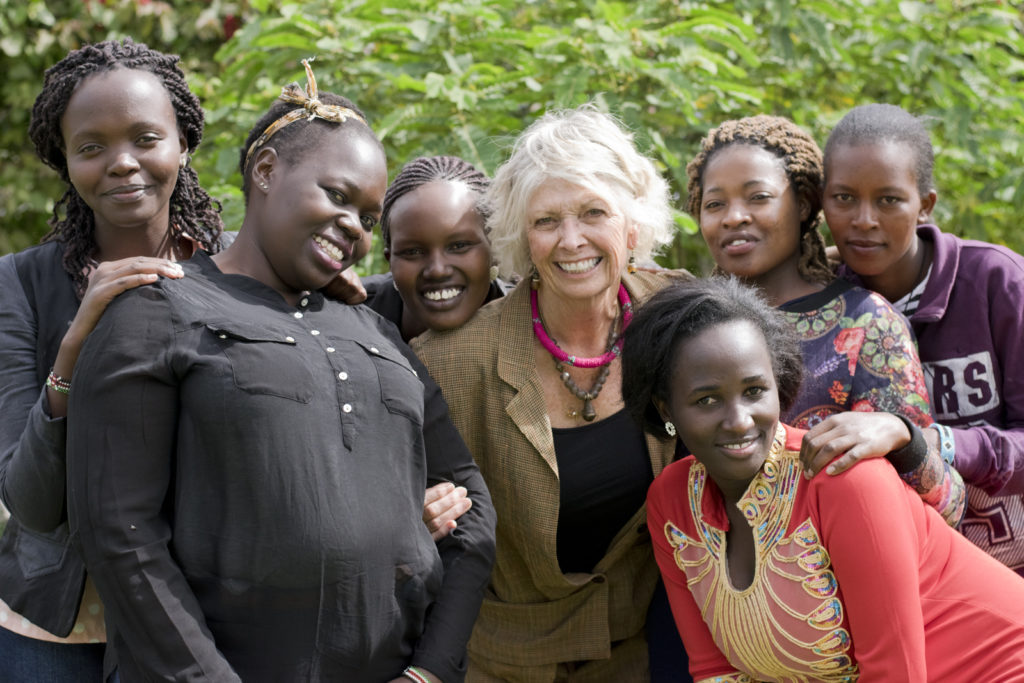Austin Woman magazine announces a partnership with Saruni International and Kanti Goods.
By Courtney Runn, Photo by Tina Hagen

Child marriage and female genital mutilation are illegal in Kenya, but both are practiced regularly. Girls as young as 8 years old can be forced to marry older men. According to recent statistics, one in two Kenyan girls are married by age 19, which is double the child-marriage rate in urban Kenya.
This spring, Austin Woman is beginning a partnership with Saruni International and Kanti Goods to help put an end to the cycle of violence and injustice affecting Kenyan girls and women. Instead of recycling old AW magazines, staff is mailing them to Kenya, where they will be turned into gift bags, with proceeds going toward education funding. When girls are educated, they are not only revered by their community, they also learn their legal rights. Austin Woman’s staff believes change happens when women support women.
Mark and Tina Hagen, founders of Saruni International, first learned about the prevalence of child marriage and female genital mutilation in rural Kenya more than 10 years ago while on a mission trip with their church. Once they discovered the horrors Kenyan girls face daily, they couldn’t turn away. After many teary, restless and prayer-filled nights, they decided to split their time between Kenya and the U.S. so they could build The Olooloitikoshi Girls’ Rescue Center. In 2009, construction began, and to date, more than 90 girls have been rescued by the Hagens. In 2014, the pair founded Saruni International, a standalone nonprofit to continue to raise funds for the GRC.
The center provides girls with food, running water, a place to sleep, medical care, clothing and access to education, primarily through individual sponsors and fundraising. Not only do the Hagens provide these essentials, but they also want to prepare girls to return to their homes throughout Kenya. The Hagens “try not to look at issues with Western eyes,” and have no interest in changing the Kenyan culture. Instead, they say they “equip girls to become role models and leaders in their world.”
While the percentage of Kenyan women who receive higher education has continued to rise in the last few years, overall, women receive less education than men. At the GRC, 100 percent of the girls who want to attend college have the opportunity. To prepare for life after the GRC, girls can enroll in a transition program that offers rigorous interview training, teaches necessary life skills and provides financial compensation for college. When girls return home to their villages, they are viewed with a new level of respect and are seen as primary providers and counselors, but as some of the few educated, employed members of the community, they risk financial exploitation. The center helps prepare them for this reality and encourages them to invest in their future so they can provide for their families in the long term rather than simply meet immediate needs.
“Sustainability is one of our primary goals,” Tina Hagen says. “If we just give [the girls]things and they don’t learn to take care of themselves, we’re doing them a much bigger injustice. … They will change their culture and practices, not us.”
While the girls work hard, entry-level jobs don’t pay much, and like in the U.S., it is expensive to attend college. So, a second women-run company stepped in with a solution.
Ernestine Lammers, founder of Kanti Goods, travels the globe searching for high-quality, fair-trade products made primarily by female artisans. While on a trip to India a few years ago, she noticed most of what she was buying was wrapped in bags made of newspaper, bags she later learned were being sold to raise money for polio patients. That is when an idea struck her.
Today, the girls at the GRC make gift bags for Kanti Goods using copies of Austin Woman magazine. Lammers reached out to Founder Melinda Garvey to begin a partnership that would not only provide financially for these girls, but also inspire them. With AW’s mission to support women, Garvey believes the partnership is a natural fit and is proud to be able to support women on an international level.
Now, when the Hagens go to Kenya, they load up their suitcases with magazines. The gift bags then make the trek back across the Atlantic Ocean to Lammers, who uses them to package her products for Kanti. She purchases 1,000 gift bags per year, with the profits going directly back to the girls at Saruni. In addition to using the gift bags for her own business, Lammers encourages other organizations to use the bags instead of traditional wrapping paper. The National Charity League recently purchased 1,000 bags for an upcoming event, and Lammers hopes that is just the beginning.
“When you are involved with the bags, you are part of the bigger picture,” Lammers says. “You are part of women supporting women, supporting artisans, supporting nonprofits and supporting so many different things.”

